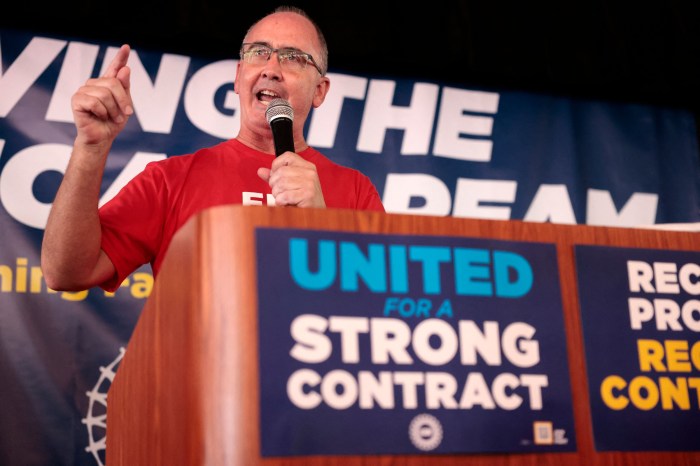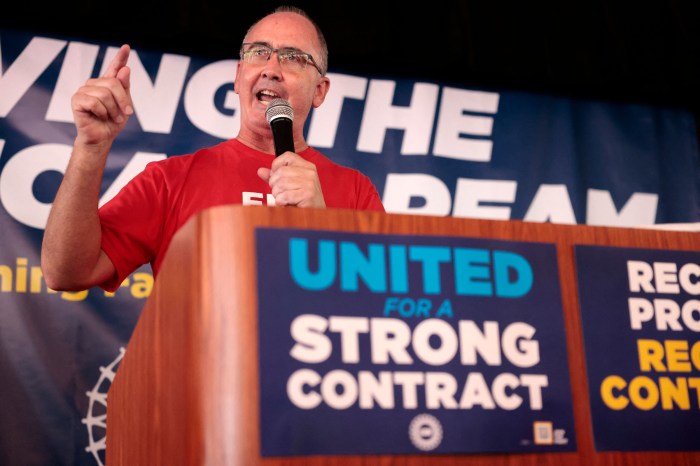
UAW Auto Workers Strike: Detroit Three Face Labor Standoff
UAW auto workers strike negotiations intensify as Detroit Three face labor standoff, marking a pivotal moment in the ongoing battle between labor and management. The current strike, which has brought production at major automakers to a halt, represents a culmination of years of simmering discontent over wages, benefits, and the changing landscape of the automotive industry.
With both sides dug in, the stakes are high, and the outcome could have far-reaching implications for the future of the UAW, the Detroit Three, and the American auto industry as a whole.
The UAW, representing over 150,000 workers at General Motors, Ford, and Stellantis, is demanding significant concessions from the automakers, including substantial wage increases, improved healthcare benefits, and a path towards a more secure retirement. The union argues that these demands are necessary to ensure a fair share of the profits generated by the industry and to protect the livelihoods of its members in the face of growing automation and competition from foreign automakers.
The Detroit Three, on the other hand, are pushing back against the union’s demands, citing rising costs, increased competition, and the need to invest in new technologies and electric vehicles. The companies argue that meeting the UAW’s demands would jeopardize their competitiveness and could lead to job losses in the long run.
The UAW Strike

The United Auto Workers (UAW) strike against the Detroit Three automakers (General Motors, Ford, and Stellantis) has become a major focal point in the ongoing labor negotiations, raising significant concerns about the future of the industry. This strike, while not unprecedented, is particularly noteworthy due to its potential impact on the evolving automotive landscape.
The UAW Strike: A Historical Context
The UAW has a long history of labor activism in the American auto industry, with numerous strikes throughout the 20th and 21st centuries. These strikes have often been driven by demands for better wages, benefits, and working conditions, and have played a significant role in shaping the relationship between labor and management in the industry.
- 1930s:The early years of the UAW were marked by a series of strikes, culminating in the successful sit-down strike at General Motors’ Flint, Michigan, plant in 1936-1937. This strike was a turning point in the history of labor relations in the United States, leading to the recognition of the UAW by GM and setting a precedent for collective bargaining in the auto industry.
- 1940s-1970s:The UAW continued to organize and strike throughout the mid-20th century, securing significant gains for workers in terms of wages, benefits, and job security. These strikes helped to establish the UAW as a powerful force in the auto industry and played a key role in the rise of the American middle class.
- 1980s-Present:The auto industry faced a period of significant challenges in the late 20th and early 21st centuries, including globalization, technological advancements, and the rise of foreign competition. These challenges led to a decline in union membership and a shift in the balance of power between labor and management.
The UAW has continued to fight for its members’ interests during this period, but its ability to secure major concessions from automakers has been more limited.
Comparison to Previous Strikes
The current strike is notable for its timing and the demands being made by the UAW. It comes at a time when the auto industry is undergoing a rapid transition towards electric vehicles and autonomous driving technologies, and the UAW is seeking to ensure that its members have a voice in this transformation.
- Demands:The UAW is demanding significant wage increases, improved benefits, and guarantees for workers in the emerging electric vehicle sector. These demands reflect the union’s concern about the potential impact of automation and the transition to electric vehicles on its members’ jobs and livelihoods.
- Duration:The duration of the strike remains to be seen, but it has already had a significant impact on production at the Detroit Three automakers. If the strike continues for an extended period, it could disrupt supply chains, lead to job losses, and further damage the already struggling US auto industry.
- Impact:The impact of the strike extends beyond the automakers and their workers. It is also affecting suppliers, dealers, and consumers. As the strike continues, the economic impact is likely to grow, putting pressure on all parties involved to reach a settlement.
Significance in the Changing Automotive Landscape
The current strike is taking place against the backdrop of a rapidly changing automotive landscape. The transition to electric vehicles and the increasing adoption of autonomous driving technologies are creating new opportunities and challenges for the industry. The UAW is seeking to ensure that its members have a voice in this transformation and that they are not left behind as the industry evolves.
“The UAW is determined to ensure that workers share in the profits of the industry and that they are not left behind as the industry transitions to electric vehicles and autonomous driving technologies.”
UAW President, Shawn Fain
This strike is a reminder of the ongoing tension between labor and management in the auto industry, and it is a crucial test of the UAW’s ability to adapt to the changing landscape. The outcome of the negotiations will have a significant impact on the future of the industry and the lives of millions of workers.
Key Demands and Issues: Uaw Auto Workers Strike Negotiations Intensify As Detroit Three Face Labor Standoff
The UAW’s demands in the current negotiations with the Detroit Three automakers are a reflection of the union’s commitment to securing better wages, benefits, and working conditions for its members. These demands go beyond simply increasing paychecks; they aim to address long-standing concerns about job security, affordability, and the changing landscape of the auto industry.The UAW’s demands are not simply about securing better pay and benefits for its members; they are about ensuring a sustainable future for the auto industry and its workers.
The union understands that the industry is undergoing significant transformation, with the rise of electric vehicles and automation creating both opportunities and challenges.
Wages and Cost of Living
The UAW is seeking substantial wage increases to address the rising cost of living and ensure that its members can maintain a decent standard of life. The union’s position is that workers deserve a fair share of the profits generated by the auto industry.
- The UAW is demanding a significant wage increase for all workers, arguing that inflation has eroded the purchasing power of wages in recent years. This increase would help workers keep up with the rising cost of housing, healthcare, and other essential goods and services.
- The union is also calling for an increase in the starting wage for new hires, which has been stagnant for years. This would help attract and retain skilled workers and ensure a more equitable wage structure within the industry.
Job Security and Benefits
The UAW is also seeking to strengthen job security for its members and ensure that they have access to comprehensive benefits. The union recognizes the challenges posed by automation and the shift towards electric vehicles, and is demanding guarantees that workers will not be left behind.
- The UAW is demanding guarantees that workers will not be laid off as the auto industry transitions to electric vehicles and automation. This includes provisions for retraining and job placement for workers who may be displaced by these changes.
- The union is also calling for the preservation of traditional pensions, which are a critical source of retirement income for many auto workers. The UAW argues that the shift to defined-contribution plans, such as 401(k)s, has not provided workers with the same level of security.
- The UAW is seeking to protect and enhance healthcare benefits, which are a major concern for many workers. This includes ensuring that workers have access to affordable and comprehensive coverage, including mental health and prescription drugs.
Work-Life Balance
The UAW is demanding improvements to working conditions and greater flexibility for its members, recognizing that workers need to be able to balance their work lives with their personal lives.
- The UAW is calling for shorter workweeks and more flexible scheduling options to help workers manage their time and responsibilities. This includes the right to refuse overtime and the ability to work from home when possible.
- The union is also demanding paid family leave to help workers care for their families without having to worry about losing their jobs.
This would allow workers to take time off for the birth or adoption of a child, to care for a sick family member, or to deal with other family emergencies.
The Impact of Meeting or Rejecting the Demands, Uaw auto workers strike negotiations intensify as detroit three face labor standoff
The UAW’s demands have the potential to significantly impact the auto industry and its workers. If the demands are met, it could lead to a more equitable and sustainable industry, with workers earning higher wages, enjoying better benefits, and having more control over their work lives.
This could also boost the economy by increasing consumer spending and creating more jobs.However, if the demands are rejected, it could lead to a protracted strike that would disrupt production, hurt the economy, and harm the reputation of the auto industry.
It could also exacerbate existing tensions between workers and management, making it more difficult to achieve a fair and lasting agreement in the future.
The UAW auto workers strike negotiations are heating up as the Detroit Three face a tough labor standoff. While the focus is on wages and benefits, it’s important to remember that the global economy is interconnected. For example, the price of coffee, cocoa, cotton, and sugar – all “soft commodities” – can be impacted by labor disputes like this one.
If you’re interested in learning more about the opportunities in soft commodities trading, check out this informative article: soft commodities trading know the opportunities in coffee cocoa cotton and sugar. Ultimately, the outcome of the UAW negotiations could have ripple effects throughout the supply chain, affecting everything from the price of your morning latte to the cost of your clothes.
The UAW auto workers strike negotiations are heating up, with the Detroit Three facing a major labor standoff. It’s a complex situation with many factors at play, including the future of work in a rapidly changing automotive industry. But amidst all the noise, it’s important to remember the basics of data privacy and how it impacts us all.
Understanding what is a privacy policy and why is it important can help us navigate the digital world with greater awareness. As the UAW strike continues, we can also consider how technology and data privacy play a role in shaping the future of labor relations and the automotive industry itself.
The UAW auto workers strike negotiations are heating up, with the Detroit Three facing a major labor standoff. It’s a tense situation, and the outcome could have a huge impact on the industry. Meanwhile, in the world of crypto, Coinbase is battling the SEC in court, drawing parallels between crypto trading and the trading of baseball cards, as outlined in this insightful article: coinbase counters sec lawsuit drawing parallels to baseball cards in crypto trade.
Both these situations highlight the evolving landscape of labor rights and the complexities of regulating emerging markets. The auto workers strike, however, remains a critical issue, as it directly affects the livelihoods of thousands of workers and the future of the American auto industry.





